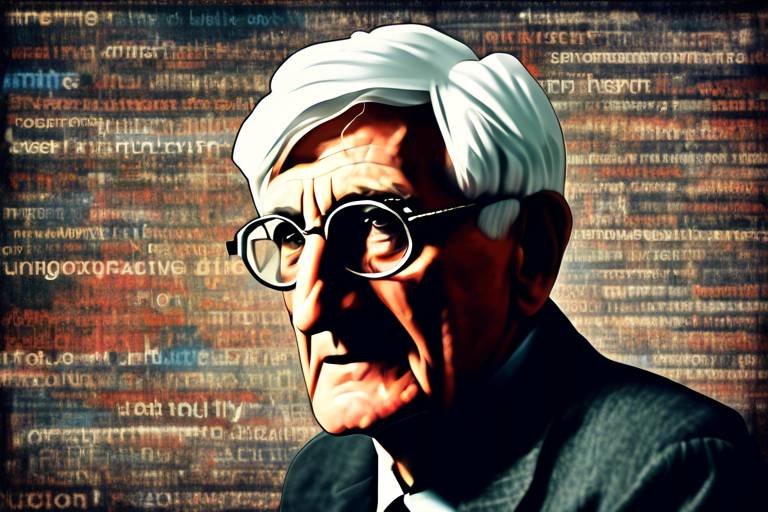The Influence of Thales in Modern Philosophy
When we think about the roots of modern philosophy, one name stands out like a beacon in the fog of ancient thought: Thales of Miletus. Often hailed as the first philosopher, Thales didn’t just dip his toes into the waters of inquiry; he dove in headfirst, challenging the norms of his time and laying the groundwork for future generations. His ideas were revolutionary, steering humanity away from mythological explanations and towards rational, empirical understanding. This shift was monumental, akin to moving from a shadowy cave into the bright light of reason.
Thales' influence stretches far beyond the realm of philosophy; it resonates through various fields, including science, ethics, and metaphysics. His emphasis on the importance of observation and reason has become a cornerstone of modern scientific inquiry. Imagine a world where questions were met with silence instead of curiosity. Thales shattered that silence, igniting a fire of inquiry that would illuminate the path for thinkers like Plato and Aristotle. His quest for understanding was not just about asking questions but about seeking answers through observation and rational thought.
As we delve deeper into Thales' contributions, we uncover a rich tapestry of ideas that have shaped our understanding of the universe. His assertion that water is the fundamental substance of all things was not merely a scientific claim; it was a philosophical statement about the nature of reality. This notion of a singular arche, or principle, underlying all existence, sparked debates that continue to this day. Thales' legacy is not just about what he discovered but about how he approached discovery itself—questioning, hypothesizing, and seeking evidence.
In examining Thales' impact, we see a clear line drawn from his ancient musings to contemporary thought. Modern philosophers often grapple with questions about existence, substance, and the nature of reality, all of which have roots in the inquiries Thales initiated. His insistence on rational thought and empirical observation paved the way for the scientific method, a framework that remains vital in our pursuit of knowledge today. Think of Thales as the initial spark that ignited a wildfire of intellectual exploration—his ideas continue to burn brightly in the fields of philosophy and science.
In conclusion, Thales of Miletus is not just a figure from the distant past; he is a foundational pillar of modern philosophical thought. His influence permeates various disciplines, challenging us to think critically and question the world around us. As we continue to explore the depths of philosophy, we should always remember the profound impact of this early thinker who dared to ask, "What is the essence of all things?" and sought answers through reason and observation.
- Who was Thales of Miletus? Thales was a pre-Socratic philosopher known for his contributions to philosophy, mathematics, and science, often regarded as the first philosopher in Western history.
- What is Thales' most significant contribution to philosophy? Thales is credited with introducing the concept of arche, the fundamental principle underlying reality, which influenced later philosophical thought.
- How did Thales influence modern science? Thales emphasized empirical observation and rational explanation, laying the groundwork for the scientific method that is still in use today.
- What was Thales' view on the nature of substance? Thales proposed that water is the essential substance of all things, marking a shift from mythological explanations to a more rational understanding of the universe.

The Life of Thales
Thales of Miletus, often hailed as the **first philosopher**, emerged in the 6th century BCE in what is now modern-day Turkey. His life and ideas were pivotal in shaping the foundations of Western philosophy, marking a significant departure from mythological explanations of the world. Born into a wealthy family, Thales had the privilege of receiving an education that allowed him to explore various fields, including mathematics, astronomy, and natural philosophy. It is believed that he traveled to Egypt and Babylon, where he was exposed to advanced mathematical and astronomical knowledge, which he later integrated into his own theories.
During Thales' era, the world was largely viewed through a mythological lens, where gods and supernatural forces were thought to control natural phenomena. However, Thales dared to challenge this narrative. He proposed that natural events could be explained through rational thought and observation, laying the groundwork for future scientific inquiry. His historical context was a melting pot of ideas, where trade and cultural exchanges flourished, particularly in the bustling city of Miletus, which was a hub for intellectual discourse.
Thales' philosophical inquiries were not merely abstract; they were deeply intertwined with practical applications. For instance, he is credited with predicting a solar eclipse in 585 BCE, a feat that showcased his understanding of celestial mechanics. This prediction was groundbreaking, as it demonstrated that natural phenomena could be anticipated and understood through observation rather than attributed to divine intervention. Such insights not only elevated Thales' status among his contemporaries but also inspired future generations of thinkers to pursue knowledge through empirical methods.
Moreover, Thales is often associated with the idea of arche, which he defined as the fundamental principle underlying all existence. He famously proposed that water is the basic substance of all things, suggesting that everything in the universe is interconnected and derived from this single element. This notion of a unifying principle was revolutionary and set the stage for subsequent philosophical debates regarding the nature of reality.
As we delve deeper into Thales' life, it becomes evident that his contributions were not limited to philosophy alone. His work in geometry established foundational principles that would influence mathematicians for centuries. Thales' approach to measurement and his methods for calculating distances and angles were groundbreaking, showcasing his ability to blend abstract thought with practical application. His legacy is a testament to the power of human inquiry and the relentless pursuit of understanding the world around us.
In summary, Thales of Miletus was not just a philosopher; he was a trailblazer whose ideas resonated through the ages. His life and work exemplify the transition from mythological explanations to rational thought, laying the groundwork for future explorations in science and philosophy. The impact of Thales is still felt today, as we continue to grapple with the questions he posed about the nature of existence and the principles that govern our universe.

Thales' Contributions to Science
Thales of Miletus was not just a philosopher; he was a pioneer whose contributions to science have left an indelible mark on various disciplines. His curiosity about the world around him and his quest for understanding transcended the boundaries of philosophy, leading to significant advancements in both geometry and astronomy. Imagine a time when the stars were mere myths and the earth was thought to be flat; Thales challenged these notions, laying the groundwork for a more empirical approach to understanding our universe.
One of Thales' most notable achievements was in the realm of geometry. He is often credited with introducing fundamental principles that would later be essential in the field. For instance, he is known for formulating the famous theorem that states: "A circle is bisected by its diameter." This simple yet profound idea not only influenced mathematical thought but also provided practical applications in architecture and engineering. The implications of his work can be seen in various modern structures, where geometry plays a crucial role in design and stability.
Thales' methods for measuring distances and angles were revolutionary for his time. He employed techniques that involved using shadows and the height of objects, which can be likened to the way a sailor uses a compass to navigate through uncharted waters. By applying geometry to real-world problems, he demonstrated that mathematics could be used as a tool for understanding and interacting with the physical world.
Thales’ approach to geometry was not merely theoretical; it was practical. He understood that geometry could be applied to everyday life, making it accessible to those who were not mathematically inclined. His work can be summarized in the following key contributions:
- Measurement Techniques: Thales developed methods for measuring the height of pyramids and the distance of ships at sea by using similar triangles.
- Foundational Theorems: His theorems laid the groundwork for Euclidean geometry, which would dominate the field for centuries.
- Practical Applications: His principles were applied in various fields, including land surveying and architecture.
In addition to his contributions to geometry, Thales made significant strides in astronomy. He was one of the first to propose that natural phenomena could be explained without resorting to mythology. Instead of attributing celestial events to the whims of gods, Thales sought rational explanations. This shift in perspective was revolutionary and marked a significant departure from the traditional views of his time.
Thales is also known for predicting a solar eclipse around 585 BC, which showcased his understanding of celestial cycles. His observations of the stars and planets were not just for academic purposes; they had practical implications for navigation and agriculture. For instance, farmers relied on astronomical observations to determine the best times for planting and harvesting crops. Thales' insights into the cosmos paved the way for future astronomers and scientists, who would build upon his foundational work.
To summarize, Thales of Miletus was a trailblazer whose contributions to science in geometry and astronomy were profound. His rational approach to understanding the world laid the groundwork for future scientific inquiry and philosophical thought. The impact of his work is still felt today, reminding us that the quest for knowledge often begins with a single, courageous question: "What if?"
- What did Thales contribute to geometry? Thales introduced key principles such as the theorem that a circle is bisected by its diameter and developed practical measurement techniques.
- How did Thales influence astronomy? Thales shifted the explanation of celestial phenomena from mythology to rational inquiry and is known for predicting a solar eclipse.
- Why is Thales considered the first philosopher? Thales is often regarded as the first philosopher because he sought natural explanations for the world around him, laying the groundwork for future philosophical thought.

Geometry and Measurement
When we think about the foundations of geometry, it’s hard not to mention Thales of Miletus. This ancient philosopher didn’t just dabble in the subject; he practically revolutionized it! Thales introduced concepts that allowed for the systematic measurement of distances and angles, which were revolutionary for his time. Imagine a world where measuring land and understanding shapes was purely guesswork—Thales changed that narrative forever. His approach to geometry was not merely academic; it was practical and applicable to everyday life, especially in fields like agriculture and architecture.
Thales is credited with several key principles that form the bedrock of geometric understanding. For instance, he is known for the Thales' Theorem, which states that if A, B, and C are points on a circle where the line segment AC is the diameter, then the angle ABC is a right angle. This theorem is a cornerstone in the study of circles and serves as a fundamental principle in modern geometry. Here’s a simple representation of that concept:
| Points | Position | Angle |
|---|---|---|
| A | Left Endpoint of Diameter | 90° |
| B | Point on Circle | |
| C | Right Endpoint of Diameter |
But Thales didn’t stop there! He also emphasized the importance of measurement in understanding the world around us. His belief that everything can be quantified laid the groundwork for future mathematicians and scientists. For instance, he famously measured the height of the pyramids in Egypt by using the length of their shadows, a technique that exemplifies his innovative thinking. This practical application of geometry not only showcased his mathematical prowess but also demonstrated how measurement could be used to solve real-world problems.
In addition to his contributions to geometry, Thales’ methods of measurement influenced the way we approach scientific inquiry today. He advocated for a rational, systematic approach to understanding the natural world, which encouraged others to follow suit. This shift towards empirical observation and measurement was a crucial turning point in the history of science.
In essence, Thales’ influence on geometry and measurement cannot be overstated. His ideas have permeated through centuries of mathematical thought and practice, shaping not just the discipline of geometry but also the way we perceive and interact with the world. His legacy lives on in the very principles that guide modern mathematics, proving that sometimes, a single mind can change the course of history.
- What is Thales' most significant contribution to geometry? Thales' most significant contribution is the formulation of Thales' Theorem, which states that the angle inscribed in a semicircle is a right angle.
- How did Thales influence modern science? Thales emphasized empirical observation and measurement, which laid the groundwork for the scientific method used in modern science.
- What practical applications did Thales' geometric principles have? His principles were applied in various fields, including agriculture for land measurement and architecture for designing structures.

Astronomy and Natural Phenomena
Thales of Miletus was not just a philosopher; he was a keen observer of the natural world, and his contributions to astronomy were groundbreaking for his time. Long before telescopes and modern scientific methods, Thales engaged in the practice of observing celestial bodies and natural phenomena, attempting to understand the universe around him. Imagine standing under a vast night sky, filled with twinkling stars, and trying to make sense of it all without the aid of modern technology. This was the world Thales inhabited, and his insights were nothing short of revolutionary.
One of Thales' most notable astronomical contributions was his ability to predict solar eclipses. While the precise methods he used remain somewhat shrouded in mystery, it is believed that he utilized the patterns of the moon's movements to forecast such events. This level of understanding was astonishing for a time when many people attributed celestial occurrences to the whims of gods or supernatural forces. Thales challenged these mythological narratives, instead offering rational explanations based on observation and reasoning.
Furthermore, Thales theorized that water was the fundamental substance of all matter. This idea extended beyond mere philosophy; it was an early attempt to explain natural phenomena through a single, cohesive principle. He observed that water could exist in various forms—liquid, solid, and vapor—demonstrating the interconnectedness of different states of matter. This concept of a singular source of existence paved the way for future inquiries into the nature of elements and their transformations, influencing later natural philosophers and scientists.
Thales also paid close attention to the stars and their movements, recognizing that they could be used for navigation and timekeeping. The idea that the stars had a predictable order and could guide travelers was a significant leap forward in human understanding. In his time, the night sky was not just a spectacle; it was a map, a calendar, and a source of inspiration. Thales' observations laid the groundwork for later astronomers, who would build upon his findings to develop more sophisticated models of the cosmos.
In summary, Thales' work in astronomy and natural phenomena was characterized by a remarkable blend of observation, rational thought, and a desire to understand the underlying principles governing the universe. His contributions not only challenged existing beliefs but also set the stage for future scientific exploration. By emphasizing natural explanations over mythological narratives, Thales carved a path for subsequent philosophers and scientists to follow, ultimately shaping the course of Western thought.
- What was Thales' main contribution to astronomy?
Thales is credited with predicting solar eclipses and proposing that celestial bodies follow predictable patterns, which was a significant departure from mythological explanations. - How did Thales influence later philosophers?
Thales' emphasis on rational thought and empirical observation laid the groundwork for later philosophers like Plato and Aristotle, who further developed these ideas. - What did Thales believe was the fundamental substance of all matter?
Thales proposed that water was the arche, or fundamental principle, underlying all existence, which influenced later philosophical discussions about the nature of matter. - Why is Thales considered the first philosopher?
Thales is often regarded as the first philosopher because he sought to explain the world through rational thought and observation rather than through mythological narratives.

Philosophical Ideas of Thales
Thales of Miletus is often celebrated not just for his contributions to science but also for his groundbreaking philosophical ideas that challenged the status quo of his time. His thoughts marked a significant shift from mythological explanations of the world to more rational and empirical approaches. This transformation was akin to flipping a light switch in a dark room; suddenly, the shadows of superstition were illuminated by the bright light of reason and inquiry. Thales believed that understanding the natural world required a systematic approach, one that relied on observation and logical deduction rather than on the whims of the gods.
One of Thales' most profound contributions to philosophy is his concept of arche, which refers to the fundamental principle or substance underlying all reality. Thales posited that everything in the universe is rooted in a single source, which he identified as water. This idea was revolutionary because it suggested that diverse phenomena could be explained through a common element. Imagine trying to solve a complex puzzle where all pieces seem unrelated; Thales provided the key piece that connected them, allowing for a coherent understanding of the universe.
Thales’ emphasis on a singular substance set the stage for future philosophical debates about the nature of existence. His ideas prompted questions like: What is the essence of being? Are there fundamental substances that make up all things? This philosophical inquiry paved the way for later thinkers who would either build upon or refute his ideas, leading to a rich tapestry of philosophical discourse.
Moreover, Thales' materialistic perspective contrasted sharply with the idealism that would later emerge in philosophical thought. While idealists posited that reality is fundamentally mental or spiritual, Thales grounded his philosophy in the tangible and observable world. This dichotomy between materialism and idealism has continued to be a central theme in philosophy, influencing countless debates about the nature of reality. For instance, the question of whether ideas exist independently of the material world remains a hot topic in contemporary philosophy.
Thales also proposed that natural phenomena could be understood through rational explanations rather than through mythological narratives. This shift was crucial in moving philosophy toward a more scientific outlook. Consider how, in ancient times, people attributed lightning to the anger of gods; Thales encouraged the idea that it could be explained by natural laws. This rational approach not only laid the groundwork for future scientific inquiry but also fostered a culture of skepticism toward dogma and superstition.
In essence, Thales' philosophical ideas were not merely abstract concepts; they were the seeds from which modern philosophy would grow. His insistence on seeking rational explanations and understanding the fundamental nature of reality has had a lasting impact, encouraging generations of thinkers to explore the depths of existence and the universe. The ripples of his thoughts can still be felt today, as contemporary philosophers grapple with the same questions that Thales posed over two millennia ago.
- What is Thales' concept of arche? Thales' arche refers to the fundamental principle or substance that underlies all reality, which he identified as water.
- How did Thales influence later philosophers? Thales laid the groundwork for later philosophers by shifting the focus from mythological explanations to rational and empirical inquiry.
- What is the difference between materialism and idealism? Materialism posits that reality is fundamentally physical, while idealism asserts that reality is primarily mental or spiritual.
- Why is Thales considered the first philosopher? Thales is often deemed the first philosopher because he introduced the idea of seeking natural explanations for phenomena rather than relying on mythology.

The Concept of Arche
Thales of Miletus introduced the profound concept of arche, which translates to the fundamental principle or origin of all things. This idea was revolutionary in a time when explanations for natural phenomena were largely rooted in myth and superstition. Imagine trying to unravel the mysteries of the universe with nothing but stories of gods and goddesses; Thales dared to step beyond that, seeking a rational explanation for existence itself. He proposed that water was the arche of all matter, suggesting that everything in the universe is derived from this single substance. This notion was not just about water in its physical form; it represented a broader idea that a single, underlying principle could explain the diversity of the world around us.
Thales’ belief in a singular arche marked a significant departure from the prevailing mythological worldview. Instead of attributing natural events to the whims of deities, he sought to understand the world through observation and reasoning. This shift laid the groundwork for future philosophical inquiry, influencing thinkers who followed him. The concept of arche can be seen as a precursor to later philosophical debates regarding the nature of existence and the fundamental substances that make up reality.
To further appreciate the impact of Thales' arche, consider the following points:
- Unity of Substance: Thales proposed that all things share a common origin, which encouraged later philosophers to explore the nature of existence and substance.
- Rational Inquiry: His emphasis on rational thought over mythological explanations paved the way for scientific inquiry, influencing fields such as physics and metaphysics.
- Influence on Successors: The idea of arche inspired philosophers like Anaximander and Heraclitus, who expanded on the concept to include other elements and principles.
The arche concept also invites us to ponder some intriguing questions. For instance, if water was the arche, what does that imply about the nature of change and transformation in the universe? Thales' thoughts on arche encourage us to explore the connections between different entities and the underlying principles that govern them. This line of inquiry continues to resonate in modern philosophy, where discussions about the fundamental nature of reality remain as vibrant as ever.
In conclusion, the concept of arche is not just a historical footnote; it serves as a foundational idea that has shaped the trajectory of philosophical thought. Thales’ courage to propose a singular origin for all things laid the groundwork for future explorations into the nature of existence, influencing both philosophical and scientific discourse for centuries to come.
- What does "arche" mean? Arche refers to the fundamental principle or origin of all things, as proposed by Thales.
- How did Thales influence modern philosophy? Thales' emphasis on rationality and a single underlying principle paved the way for subsequent philosophical inquiry, influencing thinkers like Plato and Aristotle.
- What was Thales' view on the nature of reality? Thales believed that everything in the universe is derived from a single substance, which he identified as water.

arche,
The term arche is pivotal in understanding Thales' philosophical contributions. It represents the fundamental principle or the originating substance that underlies all reality. Thales posited that everything in the universe is derived from a single source, which he believed to be water. This idea was revolutionary for his time, as it shifted the focus from mythological explanations of the world to a more rational and systematic approach. Imagine standing on the edge of a vast ocean, seeing the waves crash and recede, and realizing that beneath the surface lies a single, unifying essence. For Thales, that essence was water, symbolizing life, change, and the interconnectedness of all things.
Thales' concept of arche sparked a series of philosophical inquiries that would resonate throughout history. It challenged the prevailing mythological narratives that sought to explain the cosmos through the actions of gods and supernatural forces. Instead, Thales encouraged a shift towards seeking natural explanations based on observation and reason. This was akin to turning on a light in a dark room; suddenly, the shadows of ignorance were illuminated by the clarity of understanding.
To further illustrate the significance of arche, let's consider how it laid the groundwork for future philosophical thought. The table below summarizes the key aspects of Thales' concept of arche and its implications:
| Aspect | Description |
|---|---|
| Definition | The fundamental principle or source of all things. |
| Substance | Thales identified water as the arche, symbolizing life and change. |
| Shift in Thought | Transition from mythological to rational explanations of the universe. |
| Influence | Set the stage for future philosophical explorations of existence and reality. |
Thales' notion of arche did not just stop with water; it opened the door for future philosophers to explore other substances as potential arche. For instance, Anaximenes proposed air as the arche, while Heraclitus introduced the idea of change as a fundamental principle. This ongoing dialogue about the essence of reality illustrates how Thales' initial inquiry laid the foundation for a rich tapestry of philosophical thought.
In essence, the concept of arche is not merely an academic term; it represents a profound shift in human understanding. It invites us to question the nature of existence and the underlying principles that govern our world. Thales' legacy lives on as we continue to explore these questions in contemporary philosophy, where debates around materialism and idealism still echo his original inquiries.
- What does arche mean in philosophy? Arche refers to the fundamental principle or source of all things, as proposed by Thales.
- Why did Thales choose water as the arche? Thales believed water was essential for life and represented change and transformation, making it a fitting candidate for the underlying substance of reality.
- How did Thales influence later philosophers? Thales' emphasis on rational explanations and the search for a single source of reality paved the way for subsequent philosophers like Plato and Aristotle to explore the nature of existence further.
- Is the concept of arche relevant today? Yes, the discussions around arche continue to influence modern philosophical debates, particularly in the realms of materialism and idealism.

or the fundamental principle underlying reality. This subsection analyzes how this concept influenced subsequent philosophical thought.
Thales introduced the notion of arche, a term that signifies the fundamental principle underlying all reality. This concept was revolutionary for its time, as it shifted the focus from mythological explanations of the world to a more rational and systematic approach. Thales proposed that water is the arche of all things, suggesting that everything in existence derives from this essential substance. This idea not only challenged traditional beliefs but also laid the groundwork for future philosophical inquiries into the nature of existence and the essence of all matter.
The influence of Thales' arche can be seen in how subsequent philosophers approached the quest for understanding the universe. For instance, his idea prompted thinkers like Heraclitus and Anaximenes to propose their own fundamental substances—fire and air, respectively. This dialogue among early philosophers marked the beginning of a profound philosophical tradition that sought to identify the underlying principles of reality. Thales’ emphasis on a singular, unifying substance was a significant departure from the fragmented, mythological narratives that dominated earlier thought.
Furthermore, Thales' introduction of the arche concept paved the way for later metaphysical discussions, particularly in the works of Plato and Aristotle. These philosophers expanded on Thales' ideas, exploring the relationship between substance and essence, and raising questions about the nature of reality itself. Plato, for instance, developed the theory of Forms, which posited that the material world is merely a reflection of a higher, unchanging reality. Aristotle, on the other hand, sought to categorize substances and their properties, building on the foundational ideas laid out by Thales.
The legacy of Thales' arche extends beyond ancient philosophy; it resonates in modern philosophical discourse as well. Today, debates surrounding the nature of reality often hark back to the fundamental questions posed by Thales. For instance, contemporary discussions in metaphysics and ontology frequently engage with ideas of substance and essence, reflecting Thales' early inquiries. Philosophers continue to grapple with the implications of a singular underlying principle, questioning whether such a concept is even tenable in light of modern scientific discoveries.
In summary, Thales' concept of arche not only transformed the landscape of ancient philosophy but also laid a foundation for ongoing philosophical exploration. His pioneering thoughts encouraged future generations to seek rational explanations for the complexities of existence, significantly influencing the trajectory of Western philosophy. The ripple effects of his ideas can still be felt today, as modern thinkers continue to engage with the fundamental questions he raised about the nature of reality.

Materialism vs. Idealism
When we delve into the philosophical landscape shaped by Thales, one of the most intriguing debates that emerges is the clash between materialism and idealism. Thales, with his emphasis on the tangible and observable world, can be seen as a precursor to materialism, which posits that physical matter is the primary substance of reality. His assertion that water is the fundamental principle or arche of all things suggests a belief in a material basis for existence. This idea was revolutionary, as it shifted the focus from mythological explanations to rational, observable phenomena.
On the flip side, idealism argues that reality is fundamentally mental or immaterial. This perspective suggests that the mind or consciousness shapes our understanding of the world. While Thales might not have explicitly endorsed idealism, his work laid the groundwork for later philosophers to explore this dichotomy. The tension between these two schools of thought has persisted through centuries, influencing various branches of philosophy, science, and even politics.
To better understand this debate, let's break down the core principles of both materialism and idealism:
| Materialism | Idealism |
|---|---|
| Focuses on the physical and tangible aspects of reality. | Emphasizes the mental and immaterial aspects of existence. |
| Believes that matter is the fundamental substance of nature. | Argues that consciousness or ideas shape our understanding of reality. |
| Encourages empirical observation and scientific inquiry. | Promotes introspection and the exploration of consciousness. |
| Influences fields such as science, psychology, and sociology. | Shapes areas like metaphysics, ethics, and aesthetics. |
This ongoing dialogue between materialism and idealism has profound implications for how we perceive reality. For instance, consider the advancements in science that rely heavily on materialist principles. The scientific method itself is rooted in observation and experimentation, which aligns closely with Thales' approach. Yet, the idealist perspective invites us to ponder deeper questions about consciousness, existence, and the nature of reality itself.
Thales' contributions to this debate are significant. By introducing a rational, material foundation for understanding the universe, he set the stage for future philosophers to wrestle with these complex ideas. Thinkers like Plato and Aristotle took Thales' materialistic views and expanded upon them, leading to a rich tapestry of philosophical inquiry that continues to this day.
In summary, the tension between materialism and idealism is a central theme in philosophy, and Thales’ legacy is evident in how these ideas evolved. His emphasis on rationality and observation challenges us to consider not just what we see, but also how we interpret and understand the world around us. This duality remains relevant, prompting ongoing discussions in both philosophy and science.
- Who was Thales? Thales of Miletus was a pre-Socratic philosopher known for his contributions to science and philosophy, particularly in geometry and astronomy.
- What is materialism? Materialism is the philosophical viewpoint that physical matter is the primary substance of reality, emphasizing the importance of the observable world.
- What is idealism? Idealism is the philosophical stance that reality is fundamentally mental or immaterial, suggesting that our understanding of the world is shaped by consciousness.
- How did Thales influence modern philosophy? Thales laid the groundwork for rational thought and scientific inquiry, influencing later philosophers and shaping discussions on materialism and idealism.

Thales' Legacy in Modern Philosophy
When we think about the roots of modern philosophy, it’s hard not to feel a sense of awe at how far we've come since the days of ancient thinkers like Thales of Miletus. His ideas didn’t just fade away into the dusty pages of history; instead, they blossomed into the rich tapestry of thought that we see today. Thales is often hailed as the first philosopher, and his legacy is a treasure trove that continues to inspire and challenge contemporary thinkers across various domains.
One of the most significant aspects of Thales' legacy is his emphasis on rationality. In a time when myths and legends dominated explanations of the world, Thales dared to seek out naturalistic explanations. This shift toward rational thought paved the way for future philosophers to explore the universe through a lens of inquiry and reason. Think about it: without Thales, would we even have had the likes of Plato and Aristotle? These great minds built upon Thales’ foundations, pushing the boundaries of philosophy even further.
Moreover, Thales' ideas about the fundamental nature of reality, encapsulated in his concept of arche—the principle underlying all things—have echoed throughout the ages. This notion not only influenced philosophers but also seeped into various fields such as science and ethics. For instance, the ongoing debate about what constitutes the essence of existence can trace its roots back to Thales' inquiries. His assertion that water is the fundamental substance of all things may seem simplistic now, but it sparked a wave of philosophical exploration that questioned the very fabric of reality.
Today, Thales' legacy is evident in the way we approach scientific inquiry. His method of observation and rational deduction is mirrored in the scientific method, which relies heavily on empirical evidence and logical reasoning. When modern scientists formulate hypotheses or conduct experiments, they are, in a way, channeling the spirit of Thales. This connection between ancient philosophy and modern science illustrates how Thales’ ideas remain relevant, continually shaping our understanding of the world.
In contemporary philosophy, the discussions around materialism and idealism are still very much alive. Thales' materialistic perspective laid the groundwork for these debates, prompting questions about the nature of reality and existence. Philosophers today grapple with ideas that Thales first introduced, examining the implications of materialism in a world that often seems dominated by abstract ideals. This ongoing dialogue showcases the depth and complexity of Thales' contributions, reminding us that his thoughts were not merely the musings of a solitary thinker but rather the seeds of a vast intellectual garden.
In summary, Thales' influence on modern philosophy is profound and multifaceted. From his pioneering rational thought to his explorations of the fundamental nature of reality, his ideas continue to resonate in contemporary discussions. As we navigate the complexities of existence and knowledge today, it’s essential to recognize the philosophical groundwork laid by Thales, a figure whose legacy is as vibrant now as it was over two millennia ago.
- Who was Thales of Miletus? Thales was a pre-Socratic philosopher known for his contributions to science and philosophy, often regarded as the first philosopher in Western thought.
- What is Thales' concept of arche? Arche is the fundamental principle or substance that Thales believed underlies all reality, which he identified as water.
- How did Thales influence modern science? Thales emphasized observation and rationality, laying the groundwork for the scientific method that relies on empirical evidence and logical reasoning.
- What debates did Thales' ideas spark? His materialistic approach initiated ongoing discussions between materialism and idealism, which continue in contemporary philosophy.

Influence on Later Philosophers
Thales of Miletus, often hailed as the "father of philosophy," has left an indelible mark on the landscape of Western thought. His innovative ideas were not just a flash in the pan; they set the stage for a philosophical revolution that would unfold over centuries. Think about it: when you plant a seed, you don't just get one flower; you get a garden filled with various blooms. Similarly, Thales' contributions sprouted into diverse philosophical branches that later thinkers would cultivate.
One of the most significant ways Thales influenced later philosophers was through his emphasis on rationality. Instead of relying on the myths and legends that dominated the thinking of his time, Thales championed the idea that the world could be understood through reason and observation. This shift from mythos to logos was revolutionary and paved the way for philosophers like Plato and Aristotle, who built upon Thales' foundations to develop their own intricate systems of thought.
For instance, Plato, in his dialogues, often referenced the work of Thales, particularly in the context of exploring the nature of reality and existence. Plato's Theory of Forms can be seen as an evolution of Thales' concept of arche, where he sought to identify the true essence of things beyond their physical manifestations. Aristotle, on the other hand, took Thales' materialistic approach and expanded it, introducing the concept of substance and essence, which became central to his metaphysical inquiries.
But the influence of Thales didn't stop there. His ideas also resonated within the realm of ethics and politics. The emphasis on rational thought led to a more systematic approach to understanding human behavior and societal structures. Thinkers like Socrates and later Immanuel Kant would draw upon the rational frameworks that Thales initiated, exploring how reason could guide moral decision-making. In this way, Thales' legacy can be seen as a thread weaving through the tapestry of philosophical discourse, influencing not just his contemporaries but also those who would come long after him.
Moreover, Thales' approach to inquiry laid the groundwork for the scientific method. By advocating for observation and logical reasoning, he inspired later philosophers to adopt similar methodologies in their explorations of nature and existence. This is particularly evident in the works of René Descartes and David Hume, who both emphasized the importance of skepticism and empirical evidence in philosophical inquiry. The ripple effect of Thales' ideas can be seen in how modern philosophy continues to grapple with questions of existence, knowledge, and reality.
In summary, Thales was not merely a thinker of his time; he was a catalyst for change. His influence on later philosophers is profound and multifaceted, extending into various domains such as metaphysics, ethics, and the natural sciences. Just as a single drop of water can create ripples across a pond, Thales' ideas have continued to resonate through the ages, inspiring countless thinkers and shaping the evolution of Western philosophy.
- Who was Thales of Miletus? Thales was a pre-Socratic philosopher credited with laying the groundwork for Western philosophy, particularly through his focus on rational thought and scientific inquiry.
- What is the significance of Thales' concept of arche? The concept of arche refers to the fundamental principle underlying reality, which influenced later philosophical discussions about the nature of existence.
- How did Thales influence later philosophers? Thales' emphasis on rationality and empirical observation inspired thinkers like Plato and Aristotle, who built upon his ideas to develop their own philosophical systems.
- What areas of philosophy did Thales impact? Thales' work impacted various branches of philosophy, including metaphysics, ethics, and the natural sciences, shaping the way philosophers approach these subjects today.

Thales in Contemporary Thought
Thales of Miletus may have lived over two millennia ago, but his influence is as relevant today as it was in ancient Greece. In the bustling world of modern philosophy, where ideas clash and evolve, Thales' emphasis on rationality and empirical observation continues to resonate. His pioneering spirit laid the groundwork for a scientific approach that is fundamental in today’s philosophical discourse.
In a world often swayed by subjective interpretations and emotional reasoning, Thales stands as a beacon for critical thinking. His assertion that water is the fundamental substance of all things was not merely a statement about nature; it was a call to seek explanations rooted in observation rather than mythology. This approach has become a cornerstone in contemporary thought, where the quest for knowledge is driven by inquiry and evidence.
Moreover, Thales' ideas have permeated various fields beyond philosophy, influencing science, ethics, and even politics. For instance, his belief in the interconnectedness of all things can be seen in modern ecological philosophy, where the relationships between organisms and their environments are studied through a scientific lens. Today, many philosophers and scientists alike echo Thales' call for a unified understanding of the universe, a theme that is increasingly relevant in discussions about climate change and sustainability.
To illustrate his enduring impact, consider how Thales' rational approach has paved the way for the scientific method, which is a systematic way of learning about the world. This method involves:
- Observation of phenomena
- Formulation of hypotheses
- Conducting experiments
- Analyzing data
- Drawing conclusions
This structured approach to inquiry not only honors Thales' legacy but also reflects a fundamental shift in how we understand knowledge itself. It encourages a mindset that values skepticism and inquiry, urging us to question the status quo—a principle that is vital in today’s age of information overload.
Furthermore, contemporary debates in philosophy often circle back to Thales' materialistic views, which challenge idealistic perspectives that prioritize the mind or spirit over the physical world. This ongoing dialogue is crucial, as it shapes our understanding of existence and reality. Philosophers today grapple with questions about the nature of consciousness and its relationship to the material world, a discourse that can trace its roots back to Thales’ early inquiries.
In summary, Thales of Miletus is not just a figure of ancient history; he is a foundational thinker whose ideas continue to inspire modern philosophical thought. His emphasis on rationality, empirical observation, and the quest for understanding has left an indelible mark on the way we approach knowledge today. As we navigate the complexities of contemporary life, we would do well to remember Thales' teachings and strive for a deeper understanding of the world around us.
- Who was Thales of Miletus? Thales was a pre-Socratic philosopher known for his contributions to science and philosophy, often regarded as the first philosopher in Western history.
- What is Thales' main contribution to modern philosophy? Thales introduced the idea of seeking rational explanations for natural phenomena, laying the groundwork for scientific inquiry and critical thinking.
- How did Thales influence later philosophers? His ideas about the fundamental nature of reality and the importance of empirical observation influenced later thinkers like Plato and Aristotle.
- Why is Thales relevant in today's philosophical discussions? Thales' emphasis on rationality and empirical observation continues to resonate in contemporary debates about knowledge, existence, and the nature of reality.
Frequently Asked Questions
- Who was Thales of Miletus?
Thales of Miletus is often recognized as the first philosopher in Western history. He lived around 624-546 BCE and is known for his contributions to various fields, including philosophy, science, and mathematics. His ideas laid the groundwork for future philosophical thought and scientific inquiry.
- What were Thales' main contributions to science?
Thales made significant strides in geometry and astronomy. He is credited with introducing principles of geometry, particularly methods for measuring distances and angles. Additionally, his observations of celestial bodies and natural phenomena were pioneering, influencing later developments in astronomy.
- What is the concept of Arche introduced by Thales?
The concept of Arche, as proposed by Thales, refers to the fundamental principle or substance that underlies reality. Thales believed that water was the arche of all things, suggesting that everything originates from this essential element. This idea was revolutionary, as it shifted the focus from mythological explanations to rational inquiry.
- How did Thales influence later philosophers?
Thales' ideas significantly influenced later philosophers such as Plato and Aristotle. His emphasis on rational thought and empirical observation set a precedent for philosophical inquiry. These later thinkers built upon Thales' concepts, further developing their own philosophies and expanding the scope of Western thought.
- Is Thales relevant in modern philosophy?
Absolutely! Thales' emphasis on rationality and empirical observation continues to resonate in contemporary philosophical debates and scientific inquiry. Modern thinkers often draw inspiration from his ideas, particularly in discussions surrounding the nature of existence and the relationship between materialism and idealism.
- What was Thales' approach to understanding the cosmos?
Thales approached the cosmos with a sense of curiosity and rational inquiry. He made early observations of celestial bodies and sought to explain natural phenomena through logical reasoning rather than relying on mythological narratives. This method of inquiry paved the way for future scientific exploration.



















